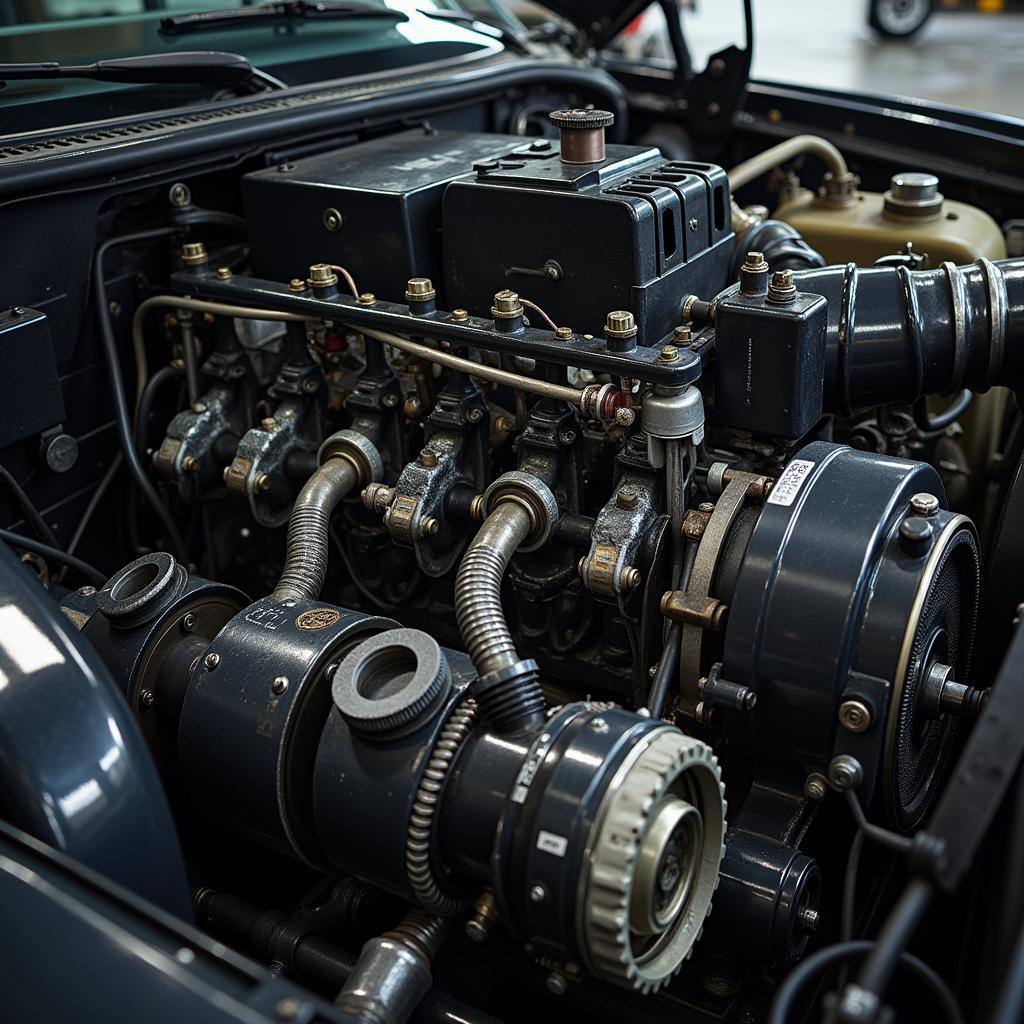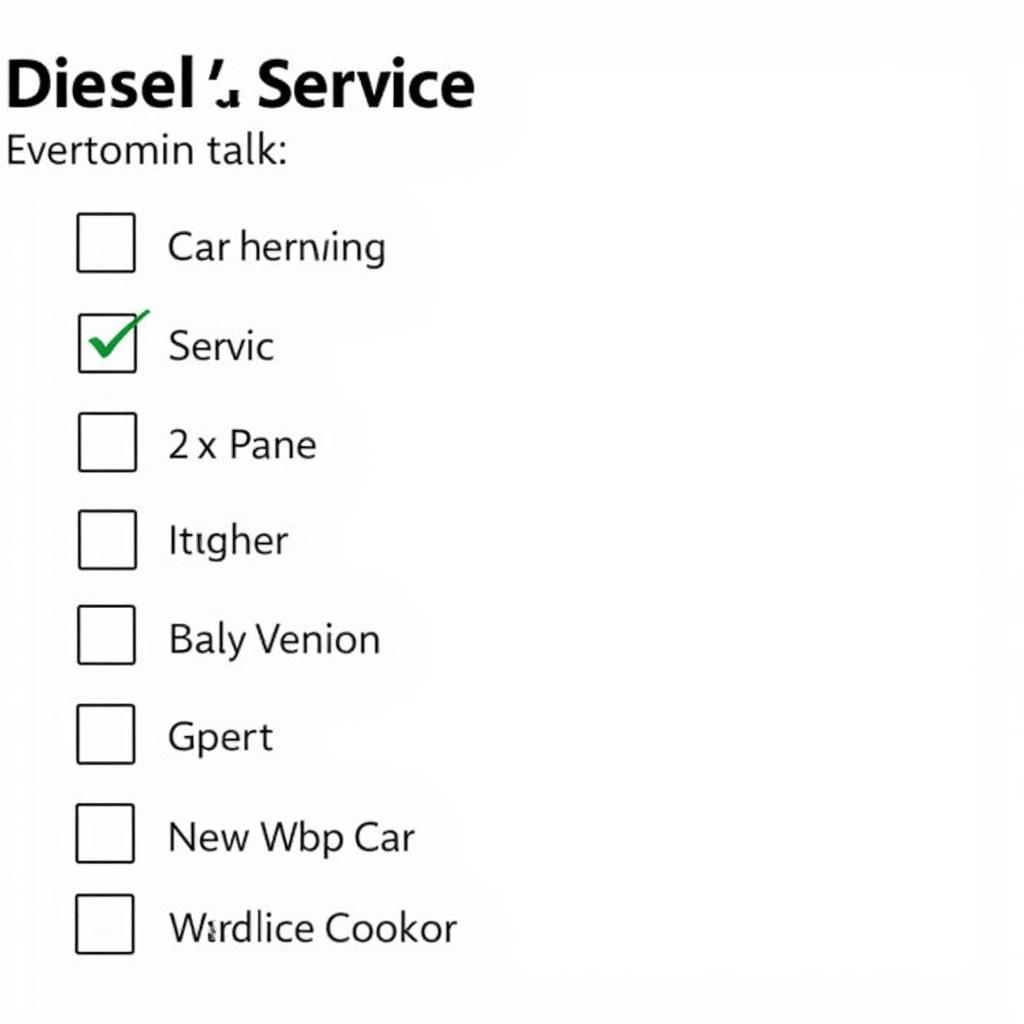What is Involved in a Diesel Car Service?
Diesel car servicing might seem like a mystery shrouded in black smoke and the clatter of engines, but it’s simpler than you might think. Just like their petrol-powered counterparts, diesel cars need regular maintenance to stay in top condition. Understanding what’s involved in a diesel car service can save you money and hassle in the long run.
The Importance of Regular Diesel Car Servicing
Regular servicing ensures your diesel engine operates efficiently, reliably, and for as long as possible. It’s about more than just keeping your car running smoothly; it’s about safety, fuel efficiency, and environmental responsibility.
 Diesel Engine Components
Diesel Engine Components
What Does a Diesel Car Service Include?
The specific tasks performed during a diesel car service vary depending on the manufacturer’s recommendations and the age and mileage of your vehicle. However, some standard checks and replacements are common to most diesel car services:
1. Oil and Filter Change: Diesel engines work harder than petrol engines and generate more soot, making regular oil changes crucial. Fresh oil and a new filter help keep the engine lubricated and free from harmful contaminants.
2. Air Filter Replacement: The air filter prevents dust and debris from entering the engine and impacting its performance. Replacing it ensures optimal air intake for efficient combustion.
3. Fuel Filter Replacement: Diesel fuel often contains impurities that can clog the fuel system. A new fuel filter safeguards the injectors and pump, ensuring smooth fuel delivery.
4. Diesel Particulate Filter (DPF) Check: Modern diesel cars are equipped with a DPF to trap harmful soot particles. Mechanics will check its condition and may perform a regeneration process to burn off accumulated soot.
5. Glow Plug Inspection: Diesel engines rely on glow plugs to preheat the combustion chamber, especially in cold weather. A mechanic will test the glow plugs and replace any faulty ones to guarantee smooth starting.
 Diesel Car Service Checklist
Diesel Car Service Checklist
6. Fluid Level Checks and Top-Ups: Mechanics will check and top up essential fluids like coolant, brake fluid, power steering fluid, and windshield washer fluid.
7. Belt and Hose Inspection: The mechanic will examine belts and hoses for wear and tear, replacing any cracked or worn components to prevent unexpected failures.
8. Tire Condition and Pressure Check: Proper tire pressure and condition are crucial for safety and fuel efficiency. The mechanic will inspect your tires for damage and ensure they are inflated to the correct pressure.
9. Brake Inspection: Your car’s braking system is critical for safety. The mechanic will inspect brake pads, discs, and calipers for wear and tear, advising on any necessary replacements.
10. Electronic System Diagnostics: Modern diesel cars rely heavily on electronic systems. The mechanic will use diagnostic tools to check for any faults and ensure all systems are functioning correctly.
Choosing the Right Diesel Car Service
When choosing a diesel car service, look for a reputable mechanic or garage specializing in diesel engines. Experience matters, especially with the increasing complexity of modern diesel technology. Don’t hesitate to ask about their experience, certifications, and if they use genuine parts.
is foster care a social service
Diesel Car Service Intervals
The recommended service intervals for diesel cars vary depending on the manufacturer. It’s essential to consult your owner’s manual for specific guidelines. Generally, diesel cars require servicing every 10,000-12,000 miles or annually, whichever comes first.
Conclusion
Regular diesel car servicing is not just a box to tick; it’s an investment in your vehicle’s longevity, performance, and your safety. By understanding what’s involved in a diesel car service and choosing a qualified mechanic, you can ensure your car remains a reliable and efficient mode of transport for years to come.
Remember, preventative maintenance through regular servicing is always better – and cheaper in the long run – than dealing with unexpected breakdowns and costly repairs.

